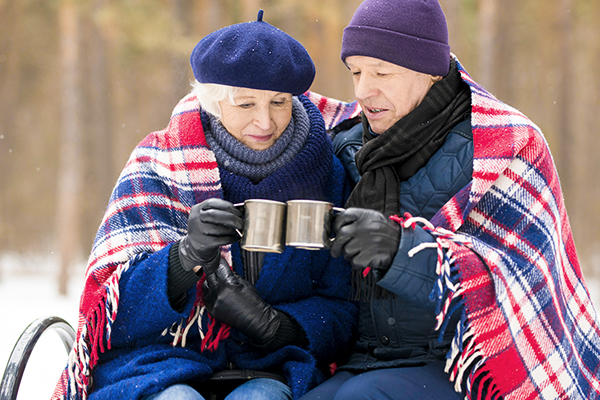Older people can lose body heat faster than when they were young. As a result, even a tiny chill can become a severe health problem for seniors before they realize what’s happening.
Follow our tips to learn how you can improve your well-being in winter.
1. Keep Your Home Warm
Living in a cold house, apartment, or other building can cause hypothermia. Do not let it get too cold inside, and remember to dress warmly and wear socks and slippers.
Make sure your house isn’t losing heat through windows. If you have gaps around the windows, try using weather stripping or caulk to keep the cold air out.
You can also ensure that your windows have extra insulation by investing in heavy drapes or curtains. This will keep the warmth from escaping your home.
2. Medicines, Illness, And Cold Weather
Certain illnesses can make it harder for your body to stay warm. So you should pay extra attention to how some of them can affect you during winter.
Thyroid problems can make maintaining a normal body temperature hard, while diabetes can keep blood from flowing normally to provide warmth. Parkinson’s disease and arthritis can also make it challenging to put on more clothes, so be sure to keep warm blankets nearby.
Speak to your doctor about your health concerns, and ask them if the medicines you take may affect your body heat. Your doctor can help you find ways to prevent hypothermia – but don’t stop taking any medication without consulting your medical professional first.
3. Frostbite Prevention
Frostbite is an injury caused by the freezing of the skin and underlying tissues. In the earliest stage of frostbite, known as frostnip, the skin has no permanent damage. Symptoms include a prickling feeling, followed by numbness and inflamed or discolored skin.
Seniors with heart disease and other circulation problems are at a higher risk. You need to be well covered when you go outside in the cold. If your skin turns red or a darker shade or starts hurting, go indoors immediately.
Wear mittens rather than gloves, as they provide better protection. Consider hand and foot warmers as well. Your foot warmers shouldn’t make your boots fit too snugly, restricting blood flow.
Run the affected area under warm (not hot) water if frostbite occurs. Don’t rub your skin – that can damage it if it’s frozen. You can also place a washcloth with warm water on the affected areas that can’t be submerged, like the nose and ears, for at least 30 minutes.
4. Prevent The Injury: Slips And Falls
It is easy to slip and fall in the winter, especially in icy conditions. General risk factors for falling in winter or other seasons include age, poor vision, chronic diseases, and the use of multiple medications.
Make sure steps and walkways are clear before you walk, and pay close attention to icy pavements. It’s important to remove snow and salt from your walkways at home. If you can’t do it alone, hire or ask someone to help you.
Wear gloves, warm clothing that covers you well, and footwear with treads and good traction. Slip-resistant or non-slip shoes are designed to reduce accidental falls, so it would be best to acquire them.
Also, remember to always bring your phone with you! If you do, unfortunately, fall, you’ll be able to call a neighbor, spouse, or medical professional.
5. Make Sure You Get Enough Vitamin D And Calcium
Most of us don’t get enough vitamin D in winter. That’s exactly when we need it the most! So, in addition to eating foods that are high in vitamin D, you should take additional vitamin D from supplements. If you’re taking a vitamin D supplement, you probably don’t need more than 600 to 800 IU daily, which is adequate for most people.
The National Osteoporosis Foundation recommends that women aged 50 or younger and men 70 or younger should get 1,000 milligrams (mg) of calcium per day. Men and women older than that should get 1,200 mg daily.
Before looking for or taking supplements, it’s essential to know that not all of them are created equal. That is why you should ask your primary healthcare practitioner to create a comprehensive preventative plan that includes vitamins and supplements.
Foods high in calcium include dairy products such as milk, cheese, and yogurt. Other foods are fish, like sardines, salmon, perch, rainbow trout, spinach and kale, soybeans, and white beans. Foods that provide vitamin D are fatty fish, like tuna, mackerel, salmon, orange juice, soy milk, cheese, and egg yolks.
Winter weather challenges people of all ages, but it can be especially difficult for the elderly. So remember to take care and stay safe. We hope you’ll be able to enjoy the cozy wonders of winter with a warm smile!
